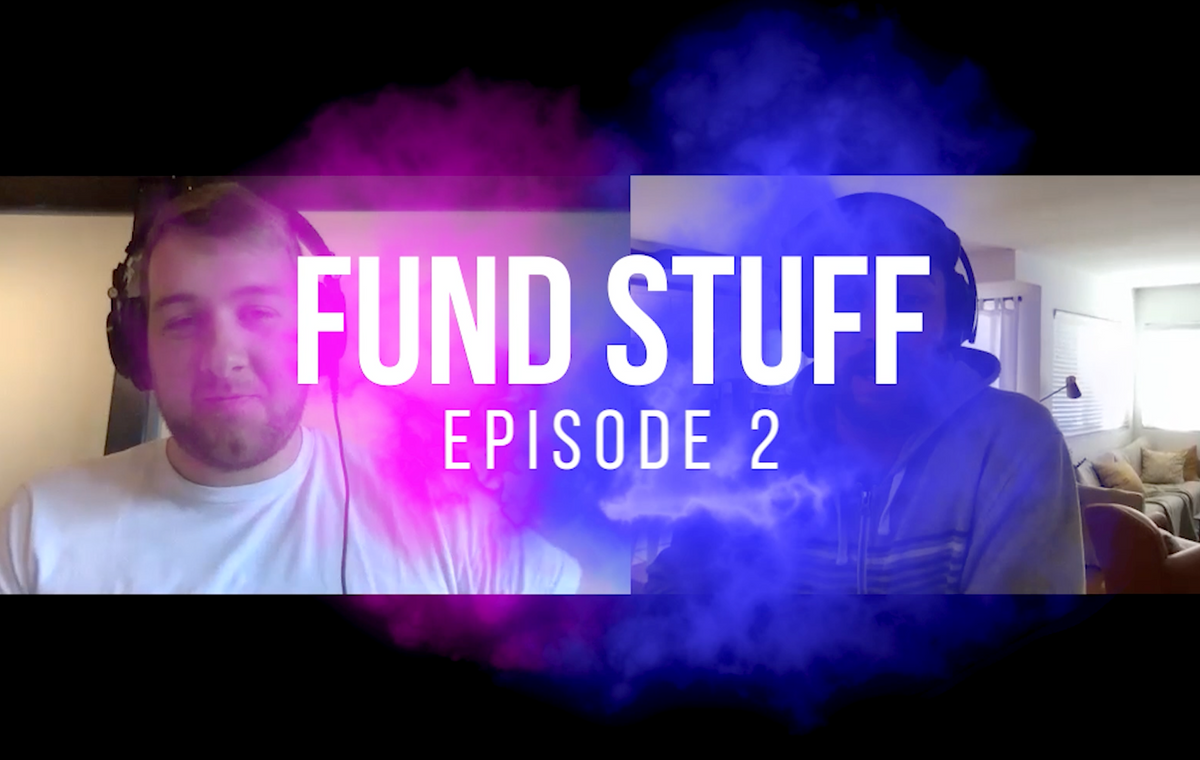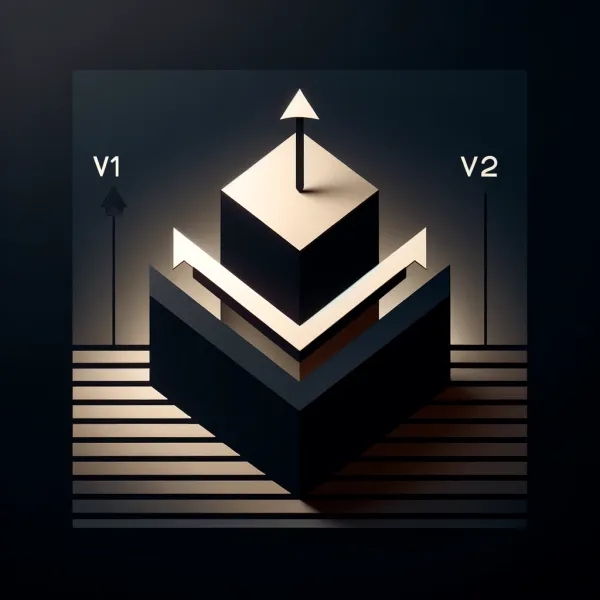Fund Stuff - Episode 2 - Nile Frater From Nocode.tech
Episode 2 of Fund Stuff with Nile Frater of Nocode.tech! Hear his story of how he acquired an anchor product for his fund and how that informs his acquisition strategy.

Episode 2 of Fund Stuff with Nile Frater of Nocode.tech! Hear his story of how he acquired an anchor product for his fund and how that informs his acquisition strategy.
Video
Audio
Transcript
[00:00:00] [00:00:00] Andrew: [00:00:00] All right, today, I'm here with Nile of no code.tech and concrete capital now, and I don't know each other at all let's get into it. Let's try it.
[00:00:10] Nile: [00:00:10] Thanks for having me, Andrew.
[00:00:10]Andrew: [00:00:10] Why don't you give me a rundown of what you're working on, because I know we were chatting back and forth and you said you were about six months ahead of us.
[00:00:17] So I'm very eager to hear what's around the corner for us, because right now I feel like I'm sitting in the middle of a dumpster fire and it's just chaos all around me. And I'm hoping that calms down in a couple.
[00:00:28] Nile: [00:00:28] Yeah know that, that sounds about right. That's what has been leaked from me for as long as I can remember.
[00:00:32] No. So I guess look at it in terms of how I got into micro, private equity and what I'm doing. No for the last few years I've had I can a corporate career, worked for the bank, et cetera. And I'd done a little bit, it kind of startups and stuff before that. But a, yeah, for the last kind of five years up until a couple of months ago, I was going to full time, consultant and a, working in corporate, doing all those kind of things.
[00:00:53] And I've been trying to start ups in the it's quite a few times. And quite often I would come up with an idea to try and get a lot of [00:01:00] traction on it. And then take it from there and I dunno if it was maybe, I don't know if I had that realization, it was a realization somewhere 2018 where that kind of added a few things out there by people like Justin meals, a Ryan Kulp, et cetera.
[00:01:12]Just as kind of term micro, private equity was starting to emerge and I had this idea of yeah. Instead of starting companies. I'm oriented trying to do a full team job. Why don't I just buy them and grow them because to be honest, to growth off, but it's about that. I enjoy a little bit more to anyway, as much as I love coming up with ideas and I love growing ideas, I don't like that button, the middle, where your leak will anyone pay for that?
[00:01:32] So idea of how do I do it, et cetera. Do I really want to spend six months building this, et cetera. Yeah, I dipped my toe in the water and I bought a couple of companies. One of them was code.tech that you mentioned. One of them was Adam network. And and the reason I C I was six months or a year to whatever it may have been ahead of you as when I read done official blog, your newsletter, eh, feel it recently, but I read it.
[00:01:55] And you guys were talking about. Things like, it's quite difficult to juggle several [00:02:00] projects at once and all that kind of thing. And that has absolutely been my experience when it, so no code.tech has as ease or the most prolific project I'm working on at the minute.
[00:02:09]Some massive no-code say has got education, has got tools, et cetera, ranks number one in Google for no code, tons, other terms it's doing well and I fought at a time. I was going to buy that and just have it for the few ones, stick some sort of course on it.
[00:02:23] And it would make money. Actually. I ended up buying it just as needed, took off as a term in 2018 and that sort of put its own challenges. So yeah, when when I can see, I feel my, a little bit head off a lot, the problems that you're running into now are definitely ones that I felt, kind of 20, 19, 20, 20.
[00:02:40] Andrew: [00:02:40] Yeah. And in terms of no code that tech, I can't tell exactly what this is, but it's like a kind of an education site almost what's that guy who has been tassel maker pamphlet it's almost like a maker pad competitor. Yeah.
[00:02:53] Nile: [00:02:53] Yeah, probably. Yeah, probably similar. We brought education really recently up until now.
[00:02:58]It's been primarily people come [00:03:00] to the website, they feigned a tool that they want their Cleco. We make some revenue best in that. Not quite affiliates, but something similar. And then yeah. Recently decided to actually Tonda and 10 education state, which does play a much bigger into that at competition.
[00:03:12] We make her pad and NACADA MBA companies like that.
[00:03:16] Andrew: [00:03:16] And when you bought it. Cause I look at this then I think I, are you a developer yourself? Do you code? Yes. Sweet. Okay. Cause when I look at this and I think content I come back to one of those stories of one of our partners who he's in private equity and naively he's like he went to like flip or something.
[00:03:32] He. A content site. And it was like, very clearly you could see the traffic just like slowly dying. And he bought it thinking like, oh great. I can use this for a couple months, make my money back. And a little bit of profit and dip my toe in the water and Google made an update and it went to like straight up zero very quickly.
[00:03:50] And he lost everything. So I look at these content sites and I think man, a it's a lot of work like who's doing all of this content stuff. Do you have a team. That's doing this for you. Are you [00:04:00] outsourcing it? How does that work?
[00:04:02] Nile: [00:04:02] Yeah. So that's essentially been a big challenge. So in terms of how it works at the Manor, eh, myself, I've got one employee between us.
[00:04:11] We do a lot of the work. We also work with a content agency. And then we make yourself a ton of automation to make the content come to leave, to collect data, et cetera, as well. It's always been upkeep and it's not just upkeep of the content it's up. How do people discover the content on say how they then are off offsite?
[00:04:30] How do they navigate to on-site et cetera? And it was always been this kind of tension between. As that's just a content say that I'm going to throw a crappy product on and go from there on actually, do you know, do we have a massive opportunity? They were number one for no COVID on Google, in the middle of, this massive new code trend actually has an opportunity here to build a bigger company.
[00:04:49]And that's been a lot about Virgil near here. We are at the bed of Edison. It was just a quick, yeah, let's put some content on here, get a product donut and actually know that it's become in a more or less a full-time team [00:05:00] focus.
[00:05:01] Andrew: [00:05:01] Interesting. Yeah. So you bought like I have, you've bought yourself a job.
[00:05:06] Exactly. Yeah. Several jobs. Exactly. Yeah. We've bought ourselves three jobs, but let's take a step back and go into just your overall all portfolio. It sounds and frankly, this happens. I used to work at a venture studio and this happened with us too. It's like in any pool of, in any batch of companies or whatever, where there's competition involved, some are gonna win and some are gonna lose.
[00:05:28] And the tendency is to take the winners, run with them and just kill the losers. And I naively, perhaps at the beginning of this, I was looking at micro, private equity and buying stuff with cashflow already as a way to mitigate that. So like maybe. My thinking was back then maybe micro acquisitions are not subject to power loss, but if you're buying something that's already working, there is no guessing, you should be able to do some kind of better prediction than you could with a company making zero versus making, I don't know, five, 10 K in MRR a month. [00:06:00] You should be able to predict like some kind of growth rate, but I don't know that's the case. It may turn out actually that even in a portfolio of profitable companies, you have power loss to there where there's just inevitably one that kind of takes off and their growth rate is, we have one right now in our portfolio too.
[00:06:15] It's We get like a hundred users a day that sign up for that thing. And it's still running on this like single digital ocean instance. It's 20 bucks a month to run the whole, it's like the most profitable, highly growing product we have. And yeah. Then we have some that are just like, struggling.
[00:06:28]They get a couple of users a day. We can hold it for three years and make our money back in a good profit. Maybe a double it but it's going to take.
[00:06:37] Nile: [00:06:37] Yeah. I think that's just the thing that's interesting about micro private equity. There's a few things here, I think ultimately we all, we barge all the different ways of doing micro, private equity under that single term at the minute, but almost, It can be very different.
[00:06:51] So the way I've approached it is twofold. Number one. So I went to companies at the minute and I bought both of them play your law places. One of them, for a fact I was high [00:07:00] for if that goes and the other one a quite law Faye figure of so nothing absolutely huge, I'm not dropping six figures here, however, It's also just me.
[00:07:08] I've got an employee in each company. Not only can operate or more, for a specific task relevant to each company, but what I don't have as I'm not a team of people. I'm not sitting here with a big checkbook buy in five companies at once and going okay. If one or two of them works, but if the other one's doing too bad, And actually both of those things can be considered micro private equity, but they're quite different.
[00:07:30] Journeys is, it's like what you said earlier, I've essentially bought a job because I had to make a bit of a decision point and I made a when lockdown started last year, when I was Th there's two ways to run these companies. I can either run them as somebody who's run two companies, governor equal attention, equal growth, yada odd.
[00:07:47] I can kinda see Right, I've got that one company that it's, it's channeling the law and it's good to embed a better solely. Could it be a lot more if I put effort into absolutely, but actually I've got this no-code company here and it looks like that could potentially be a massive company, do I go all in or not?
[00:08:00] [00:08:00] And if I was a beggar, clave equity, I probably wouldn't make that decision, I'd probably just see a bit severe. I've got several of them that said, it's a different several things that are definitely, Glasgow, et cetera. But essentially I'm no in this kind of weird place where I've packed one company to be the field team Gagan.
[00:08:15] So as much as it started off as this attempt at micro private equity, in some ways, the second company has become sort of a seed project again, and I saw, my, my vision for the future. No code good to a point where it doesn't require it to be a full-time job for me anymore audit sales or something like that, whatever it may be.
[00:08:31]And as a result, I always default back to that play for equity, and the future, if I think about, okay, this is a full-time job, but how good a wealth longer term as more back to that sort of genuine play for equity model. Yeah.
[00:08:44] Andrew: [00:08:44] Yeah. The, there's a couple of things that I thought to unpack there for the first.
[00:08:49]Maybe it's, we're trying to bootstrap a private equity company, which is like objectively a stupid thing to do, right? Like it's, that's a very hard task. So it's no surprise that both of us are getting [00:09:00] stuck operating these things that we didn't initially anticipate. We would actually be operating.
[00:09:03]Because for us, we have four people in our bank. None of us are on it. Full-time and I think that right now we're taking a look at what it would look like to find an operator for each company. So we've obviously stepped in and where, frankly, it's like each one of these projects, we buy it, the code kind of sucks, like it's definitely not going to scale.
[00:09:20] So there's a huge engineering effort. It's not actually enough cashflow. Sometimes even higher, like Upwork people. So we have to do some of it ourselves. A lot of it ourselves, I should say. One of them we bought was six figures. So there's a little bit of more cashflow to be able to hire like a developer from India.
[00:09:36] I like, we've leveled up to that point, which is nice, but still a lot of overhead terms. Project management. We have to really look at the code so that we don't get end up in a worse spot than we're already in. But yeah, I I think that the model for us, if we can figure it out is to a, this initial portfolio, like we bought three just with our own cash to prove them out.
[00:09:55] And I think later this year, we're going to, we're going to raise a fund to try and move up stack like a [00:10:00] million dollar fund where we may even just buy one, to be honest with you. Cause if you buy let's say it's a million and you get 200 grand of cashflow ish. I don't know if we can get that in this market, but I don't know.
[00:10:09] Let's just make that assumption at least with 200 grand. You're like, okay. I could find. I could find some local kind of recent graduate or some something, somebody super hungry, put them in as like a junior CEO and have them just go execute all day every day on this one product and have us run traffic interference in the background.
[00:10:28] So it's almost like we're going to be going from 100% where operating it to a kind of junior CEO where we're. Very involved, still like overseeing almost every detail, but we don't have to spend our execution hours against each particular property. And then eventually if we can take that $1 million fund and bootstrap it into a five, $10 million fund after we show some kind of success then we get out of these problems.
[00:10:53]But I don't know how to solve them in kind of this like true. Micro SaaS where you're talking about like under six [00:11:00] figures or right around six figure acquisitions. It's just tough. There's just not that much cashflow to kickoff. Like I think we initially thought we would buy it. Great there's cashflow.
[00:11:08] We can do all this fun stuff with cashflow, we're going to be, like Warren buffet and Charlie Munger, just, shit's going to be kicking off cash flow and the like, we're just going to be buying other stuff with that cashflow. It's no, you're giving most of that cash flow to like developers or, fucking Heroku or AWS or something like that.
[00:11:26] There's 80 bucks leftover at the end of the month. And you're like, okay I'm not going to take a $20 distribution. That's stupid. But yeah it's a tough spot.
[00:11:36] Nile: [00:11:36] Yeah, I taught I think first of all a big lesson learned for me as I wouldn't buy another company, we're also having a percentage of the capital allocated to hiring someone for at least the first year to run up.
[00:11:49]And that's not even going into do I need to develop it, et cetera. It literally it's okay, this is your problem. Then I'm going to pay you for that to be your job. And, but, you're the off-putting or that's definitely a big lesson cause I think otherwise, yeah, [00:12:00] you're absolutely right.
[00:12:02] You're buying the job, it's the same as at an organization you start in a cafe or something like that. We are, us kind of thing. That's just, there are so many things going on that you have to be intensely all over it. A big learning for me is okay. If I think I can afford, let's see a hundred ki I'm actually going to want to buy a company for 50.
[00:12:18] Cause I'll spend the other 50 higher than someone, whoever it may be, I think the interesting thing here as and I've a few faults and engineered and saved, but the interesting thing here. Th there's a bit of a, still a fault in micro, private equity of, should these be treated like companies and what, as should you be a net as a founder sort of personality, thinking about all aspects, trying to look for unique strategies, unique playbooks for each company, or do you need to find a way to commodify it?
[00:12:46] Yeah. Do you need to find a way for it to be like real estate? It doesn't matter where you buy real estate. You can flip it, you can rent it, you can put a new bathroom and et cetera. And there's a thought process in my head of how do you feel it? A cohort of companies that are [00:13:00] worth buying, you can apply fairly standardized playbook.
[00:13:03]I can just buy this and say, I'm just going to throw a paid ads. So that's okay. And it will work good. It won't work. Or buying a company. We had that as a growth channel that's working in, and obviously it was a hard tech buyer, buying a company with it as a off channel that's working, but you can simply put a lot more fuel in the fire than someone else can, which of course then brings you back to a wide range.
[00:13:20]An angel enjoy something like that, et cetera. But I think the, I think there's just this tension between we, as people in the micro private equity space would really like there to be I real estate type approach to this where you can take a commodified playbook and then that sort of balanced against, yeah.
[00:13:37] I just don't know if that's possible for a company to an author, the complexity is too high.
[00:13:43] Andrew: [00:13:43] Yeah, I was all objective names. Cause I haven't gotten their permission to share some of these things, but I was talking to. I've just been investigating how the bigger guys do it, right? Like how to share swift, do it, how to some of these other guys do it, how to signing capital to it.
[00:13:56]And somebody mentioned that the playbook for after they [00:14:00] acquire it is like a one, I got the sense that on the smaller side, unless the company can support an engineering team, the actual private equity firms themselves haven't really solved any kind of engineering problems, meaning. There's no real shared resources between companies like we bought each product, had a different coding language was just, in hindsight, just obviously stupid.
[00:14:23]But they haven't really solved the engineering problem in the sense that they're going to have to move up stack almost by definition because they're going to need to use the money, the cashflow, or, Whatever additional capital to do and to pay for engineering on the growth side, though, what I did find encouraging was that they said that the most of the time, their playbook is just.
[00:14:42]Very obvious levers, right? What is conversion? Is that an industry standard conversion? If not right. This is like a flow chart. Then we're working on conversion until that number comes up. Okay. What's next? Does our Google ads like revenue positive for us? Can we make our money? Can we make our money back doing those things?
[00:15:00] [00:15:00] Yes or no? Okay. Do the same thing for LinkedIn. Do the same thing for Facebook does cold email work, right? All of those kinds of things are in my mind, it was. I always joke that I only have like mediocre revelations these days, but that was like one of the more profound mediocre revelations that these guys are just, even at the bigger scale pulling on very obvious levers.
[00:15:20] And one thing that I do think I know it's easy to get bogged down in oh, do we buy it? Or do we build it? Even at the smaller when w we're buying stuff, we have one product that was like an XYZ company. And what's great. Is that. That motherfucker gets traffic. It gets 200 people a day.
[00:15:34]And I have I have stuff to go play with. I have data to go, manipulate and change and try and run experiments. Because the real problem for me, when I go to build stuff is, you don't know if it's going to work for sometimes a year. Like I got super lucky recently with the product I service.
[00:15:49] It's like a small marketing agency and again, not easily, I thought, oh, great. We'll buy these companies. I'll run them through like my growth marketing agency and boom money will fall from the sky. [00:16:00] And of course, like we haven't even gotten a chance to test that thesis out yet. Cause we've just been like, solving fires on the engineering side, just trying to keep like servers up and moving it to a real production, like high availability stuff.
[00:16:11] But Yeah, that was that was, I don't know, I took it to heart and that they were just pulling on very obvious levers to get growth. So I think that you're right. I think that there is a kind of playbook that could be copied relatively simply. I don't know that you could full on outsourced executive assistant from the Philippines run growth for an entire like company making a few thousand a month.
[00:16:31] I don't know if it's that replicable, but it didn't seem like too far off.
[00:16:36] Nile: [00:16:36] Yeah. And I think that's ultimately, that's that. Yeah. You've always got to look for. Obvious or leavers. And quite often though, there, whenever I've looked at a company before they even approached, I was trained, have five or 10 different things.
[00:16:51] And even if only two or three of them are really the ones I would do, but, favorite 10 different things that I would go for. But I think the tracker, but with that as [00:17:00] unlike a definite investment, like if I have a house rate other than buying a house that ends up being a total wreck, when you've got a good rate back to the walls, It can only go sort all, okay.
[00:17:11] If I need to go in and do the bathrooms, maybe I've also got to do the Papes, but then that's that. Whereas with accompany, it may be your care. Conversion's not working. Okay. That's because the possessions aren't right. But actually it's not, the possession is not right. That we're sending their own customer.
[00:17:23] And then suddenly you just go by FDA. If you buy it own business and go down that rabbit hole, you've suddenly. As a solvable problem. Absolutely. But can your soul favor those at the same table? That's about harder. It's about more expensive. It's that, you just keep pulling.
[00:17:36]And one of the things that I don't know if that's just a bit controversial on, twice our MPE Silicon valley tapes, of course, et cetera. But I just don't think I would buy a company for the engineering effort. Again, I think if I was ever to buy a company, no, I would go in with the assumption.
[00:17:54] That I'm going to throw all the tech and all I want as the existing brand, the existing [00:18:00] distribution, et cetera. And actually I would even go a step further and see the next company that only it with Hubei will simply be something that adds more distribution to the existing companies that I have.
[00:18:10]When I look at engineering problems, You've mentioned a lot of the, but tick any engineer, who actually leaks, edit in someone else's court normally. So you've got your card and you've got to understand it. You end up reworking bits of that. And then suddenly, at slate, I get, I'll go back to the house analogy.
[00:18:26] Anytime, you do a renovation, you change one thing, and then you're like, oh, I got your pin. That's what I got to do that. And suddenly, one task, tons anti-free and I think it's so easy to do that when you're buying. TA for the tech. And I think, obviously I'd run an awkward.
[00:18:39]So I've got to say that, I do think tech is becoming a lot more commodified that I know a lot more people who can build things, but that I'll start with a massive dark drift people who can, grow and market them and sell them,
[00:18:52] Andrew: [00:18:52] yeah. Yeah, that's a really good point. The hard part though, is with some of these products, it's actually way harder to like, if [00:19:00] you're buying something say it's a pure SAS product.
[00:19:02] You're buying something. It has users building against, even if you're, even if you're replatforming, and say, like changing, programming languages and writing it and like the stack that you prefer. Doing the migration against something that already has existing users that really don't want any downtime at all is such a harder problem than just going, almost going from scratch.
[00:19:21]Because you're starting from scratch, but you also have these really weird constraints about like how somebody else organize the database. And frankly even for the ones that we rewrote we didn't get around. It was just going to be too painful to like, do a total, like restructure of the database and all that shit.
[00:19:34] It was like, ah, fuck it. We'll just, whatever we're going to make it as good as we can get it. It's fine. And then move on. But you're right. Maybe it's the case that I know the move that in five, 10 years, when the tech catches up, the no-code tech catches up, the move is going to take a product byproduct that was unprofitable with five inches.
[00:19:50] Rebuild it and no code, and it will be profitable with one no-code engineer, citizen developer, or whatever the fuck they're going to call themselves five years from now. That will be the move. And that's going to work. [00:20:00] Great. I don't know. I don't have a confidence level that I could take.
[00:20:03] For example. Totally box, which does like bug reporting feedback. Like that is a Chrome extension backend front and back in front. And I think could maybe get on like a bubble. I worry about I don't know where the ceiling is for that stuff. That's where my comfort level with no code ends is I'm totally cool with it as an MVP, but I'm totally uncool with it.
[00:20:22] The second that it's done and I have scaling problems, I just immediately regret and I'm like, fuck, I wish. But to spent the extra two weeks to build it in code. But obviously over time, that's going to move up to the point where it's just not an issue anymore. But I don't know. That would be a cool move to think about as maybe we just take this new rewrite that we have to do, which I mean, that's very real, we're like going out and getting specs for a full card laundry. And also just get one from a bubble developer and say Hey, what could you do? What could you do in bubble today? And three weeks, right? That would be, that'd be pretty.
[00:20:51] Nile: [00:20:51] Yeah. And I think, I think that is going to be a lot closer than five years, so you can own your idea, but yeah.
[00:20:59] The scaling [00:21:00] of stuff. Wait, I find a problem with no quarters. It's not at scale to handle X number of users that are in flight that, but it's how many little compromises do you need to make, home and a lot with daft things here than they are. Have you got a compromise with an, a tool, your web floor?
[00:21:15] Eh, so we use a warm stacks, a web floor. We have table members staying Zapier for No code.tech, and I've been not terrible a bit free in the morning, the last three nights working on a bit kind of a replatform for some of this stuff. And it's just little things that, that, that can be difficult on a tool like that.
[00:21:32]For example, if I want to filter something by name, I can, I can't see it. That's name. These layers. I've got to say, it's either this word or that. It's just selling a lot more things like that, and they're not every tool has those restrictions or those problems. But I think the difficulty as I, I worked with
[00:21:51] Which for the year, so I can easily look at more software and see that can be done in Norco that it can, or it can, but it's going to have a massive caveat or whatever. And [00:22:00] that's just a skill I've learned. I'm not sure how easily it comes to other people. Maybe it doesn't. So I look at a lot of these knowing I go, yeah, I could definitely do that with her cord on a desk.
[00:22:07] They couldn't, th the way I kinda think of it, but I looked at acquiring a product in 2020 at one point and. I just pictured myself like certain for the first time, don't lose Nicola, train, eat, get up and run again. Trying to make it work in my machine. And I just fought.
[00:22:20] That's not what I want to do. I really just don't want to do that. Maybe in the future, I'll hire someone to take care of that, but I, yeah I just think for me really. The absolute ideal purchase as an essence, an obvious thing again can only be used today. There were obvious revelations, the most ideal purchase for me as a product as, as little as possible.
[00:22:41] And I'd like to buy a newsletter. That's got a big audience and then come, of course who wouldn't be, but I just want to have the list exposure to tech possible. No, because to me it just feels like it's such a cost center, right? Don't mean to have an exposure to a complicated market and filling work because of so much I can [00:23:00] optimize air to make more money or whatever it may be, but Tech's just a nightmare.
[00:23:03] And I see that's this, I've been coding no for 15 years, something like that. So
[00:23:08] Andrew: [00:23:08] I don't disagree. I don't disagree. This was a great conversation. We're coming up on time. I think two of the things I didn't get to is maybe we'll do around to one liquidity on the sell side. I would just be curious to get your opinion next time.
[00:23:22] And then also too, I just love the idea of having I don't know what you'd call it, but no code tech is like your anchor products and you're going to start building, it's almost like a closet roll up strategy around it. Like how do I. How do I make the, like the mothership, your NOCCA tech bigger, right by acquisition, which is a very, tried and true playbook.
[00:23:42]Like accountants have been doing that shit since, 1492, buy in the competition. And rolling it up into one big entity. Whereas for us, I don't think that we've found that yet. We've bought three quite disparate products that, that. Don't really have anything to do with each other which is just a different kind of strategy, but I think we'll have [00:24:00] to get to that next time, but thanks so much for your time now, and it's actually really great meeting you.
[00:24:04]Thanks for chatting.
[00:24:05] Nile: [00:24:05] I appreciate it. Thanks so much. And we'll speak again soon, right on.





